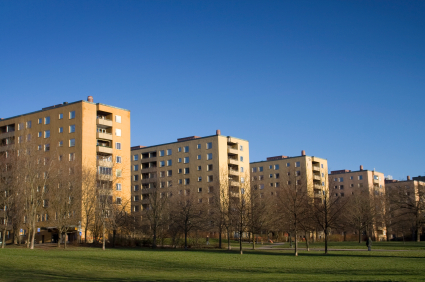Legionella in Residential and Social Housing
What is a Landlord?
A landlord is anyone who rents out a property under a lease agreement or licence that is less than seven years. Whether it is a room within a property or the whole property that is provided for a rental fee the owner is described as a landlord. Typical Landlords include: Local Authorities, Housing Associations, Private Sector Landlords, Housing Co-operatives and Hostels etc.
We provide legionella services to all the above however, recently, there has been some confusion around the requirement for legionella management in residential housing due to misinterpretation of the requirements. Consequently, we have put together this information to offer a clear understanding of the requirements.
A Few Common Questions to support this sector.
Do Landlords and RSL’s have a responsibility under the HSE’s Approved Code of Practice L8 document to cover the water services for legionella in social residential housing stock?
The simple answer to this question in “Yes”

Do RSL’s need to check every residential unit in an apartment block as part of the legionella risk assessment?
The simple answer to this is “No”. However, this is where the residential units are identical and a representative proportion can be assessed.
What is the most important part of the legionella management service in Social Housing Projects?
Following the Risk Assessment, it is essential that there is good Management of any Communal Water Services under the Landlords Direct Control or responsibility. It is also important that tenants are offered or provided with or access to good general water services and water hygiene information to support maintenance of the water services within the apartment or property.
Has the legislation recently changed for Private Landlords?
Short Answer “No”. Landlords have always been required to assess and manage the risk of legionella in privately rented residential property. However, the recently reviewed HSE ACOP L8 makes this requirement a little more clear. Consequently, this seems to have jump started a new wave of Companies (mainly from the Energy Performance Certificate Sector) offering Legionella Risk Assessments to private Landlords on the basis that it is a new requirement. However, this is not true. The requirement has been the same since 2001.
How difficult is it to conduct a legionella risk assessment in a small residential property?
The HSE suggest that if a Landlord is “Competent” and the water system very basic, it should be possible to carryout the Legionella Risk Assessment themselves. However, from our experience, there is much ambiguity around what is deemed as “Competent” and what is deemed as a basic water system. Likewise, there are many plumbing issues that are common in such properties that will need particular knowledge to rectify appropriately or manage cost effectively. As such, for peace of mind, it is suggested that a professional who is registered with the Legionella Control Association be appointed.
Does the risk assessment need to be as detailed as an office building?
Simple Answer “No” The HSE suggest that the risk assessment for basic residential property does not need to be in depth or complex. A simple assessment may show there is no real risk or that the risk is low. However, assessment of the risk should be done by a competent person and reviewed regularly.
Do I need a Landlords “Legionnaires Testing Certificate?
Short Answer “No”. There is no such thing!. There is a legal duty for landlords to assess and control the risk of exposure to legionella bacteria, but Health and Safety law does not require landlords to produce or obtain, nor does the HSE or Aqua Legion UK recognise, a ‘Legionnaires testing certificate’ which some companies have been miss selling as a legal requirement.
Do Landlords need to conduct water sampling as a legal requirement?
Short Answer “N0”. Whilst the risk assessment is a legal requirement, water sampling or legionella testing is not. However, in certain circumstances it may be necessary to carryout water sampling as a precautionary, reassurance or verification measure. Any such measures should be highlighted in the risk assessment.
How can control measures be implemented to manage legionella in social and residential housing?
In some cases, it may be necessary to implement some simple, proportionate and appropriate control measures to ensure any risks remain low. For most domestic hot and cold water systems, temperature is the most reliable way of ensuring the risk of exposure to Legionella bacteria is minimised. ie keep the hot water hot, cold water cold and keep it moving. Other simple control measures to help control the risk of exposure to Legionella include, flushing out the system prior to letting the property, avoiding debris getting into the system (eg ensure the cold water tanks, where fitted, have a tight fitting lid) setting control parameters (eg setting the temperature of the hot water cylinder (calorifier) to ensure water is stored at 60°C) make sure any redundant pipework identified is removed.
What do tenants need to know?
Where control measures are put in place tenants should be advised eg guidance should be given not to adjust the temperature setting of the calorifier, to regularly clean showerheads and inform landlords if the hot water is not heating properly or there are any other problems with the system. Where showers are installed, these have the means of creating and dispersing water droplets (aerosols) which may be inhaled causing a foreseeable risk of exposure to Legionella. If used regularly (as in the majority of most domestic settings) the risks are reduced but in any case, tenants should be advised to regularly clean and disinfect shower heads.
Facing up to the reality – legionella in social and residential housing stock:
The fact is that all Housing Associations, Local Authorities and Landlords including individuals providing privately rented residential accommodation do have a legal obligation to address the risk of legionella. The HSE’s Approved code of practice applies in any situation where there is a commercial undertaking
Consequently, if you are a provider of such accommodation you may already be aware of your responsibilities to ensure the risk from exposure to legionella is adequately managed. If you need cost effective help in starting a legionella management programme for your residential portfolio please contact Aqua Legion now.
So what do you need to do to start managing legionella in social residential housing
First Landlords should conduct a water legionella risk assessment to cover at least the communal services and a representative proportion of identical apartments.
Communal tanks are common in large residential apartment blocks. Communal tanks will need to be adequately managed including annual inspection and sampling in line with the Drinking Water Inspectorate guidelines if they provide drinking water to the apartments.
The legionella risk assessment for large council estates and social housing projects can often be done without gaining access to all of the individual apartments but a representative proportion should be agreed and accessed if reasonably practical to do so.
By ensuring the communal services are covered adequately and that reasonable attempts are made to gain access to at least 10% of the units, your organisation should be able demonstrate clear effort towards compliance.
A pragmatic approach to legionella risk assessment and management of legionella in social residential housing should be adopted at all times.
Sheltered Residential Accommodation
Although all high risk category residential accommodation such as sheltered accommodation, care homes and shared service buildings should be fully risk assessed and control measures put in place to cover any communal systems if present. Simplified risk assessment formats should be developed or agreed to cover the lower risk properties or categories.
A simplified risk assessment format should mean lower costs, however, it is important that any such assessment remains valid and resolves to provide the Landlord with adequate cover. As such the risk assessment is best conducted by a competent person regardless of the final report format or content.
Where maintenance is considered too expensive, then alternative control measures and engineered solutions should be adopted to control any risks identified.
It is also important to educate tenants on the proper management and maintenance of the water services. This can be achieved via internet platforms, newsletters and information packs.
The management of legionella in social residential housing can be a challenge, particularly when the portfolio is extensive. However by implementing a pragmatic approach to the legionella risk assessment process and control regime, the risk of legionella in social residential housing can be covered cost effectively.
The common problems with controlling and managing Legionella in social residential housing or council mixed stock include:
Mixed sites with a single landlord can often pose significant issues when trying to manage the risk of legionella.
For examples, where a site is fed from a single water meter and piped to several buildings and storage tanks.
Where individual buildings are let and sublet to a number of tenants who manage their own demised areas.
Where hot water is provided from a single source with a number of outlets which cannot be tested due to legal access issues.
How do we overcome such issues?
It is important that communal areas are assessed or scheduled for assessment on a running programme. All risks identified in communal areas should be addressed and managed.
Communicate with your tenants, ask the right questions to determine any water supply issues. Tenants can also help with identifying issues so use their valid knowledge to gain information on your properties.
Where intelligence indicates the requirement for a more detailed survey or inspection, appoint a competent person to assess the accessible systems and address any issues identified in a timely manner.
Review previous maintenance history

Educating your tenants on water hygiene practices and the risks of Legionella will serve you well should a situation arise.
It is extremely important that Housing Associations and Landlords retain records specifically relating to legionella management and control. The records are to be used to demonstrate clear efforts towards the management of the risks associated with legionella in social residential housing. Records should include site risk assessments, routine inspections and remedial actions taken to reduce the risk of legionella.
What not to do:
Whilst it is generally accepted that the risk of legionella infection from well maintained and permanently occupied residential accommodation is low. There are a number of situations that can magnify the risks at any particular location and time.
It is extremely important to emphasise that if you do nothing to manage the risk of legionella infection in your portfolio of residential or social housing projects, then you will have an increased exposure to risk of litigation from your employees, visitors and tenants. Further to this, you may be putting many of your own staff and susceptible clients at significant risk. Ignoring the issue will only amplify the problems in the long run.
The risk of legionella in social residential housing is real and will need to be addressed. If you require support in managing this risk mindfully, please do not hesitate to contact us.
If you need further information or would like to arrange a meeting to discuss how we could support you as a Landlord or Organisation please contact us today!
Further HSE guidance: